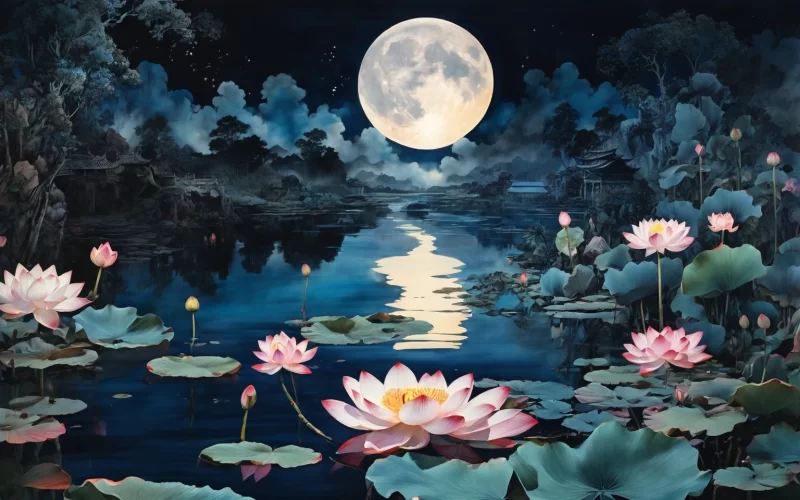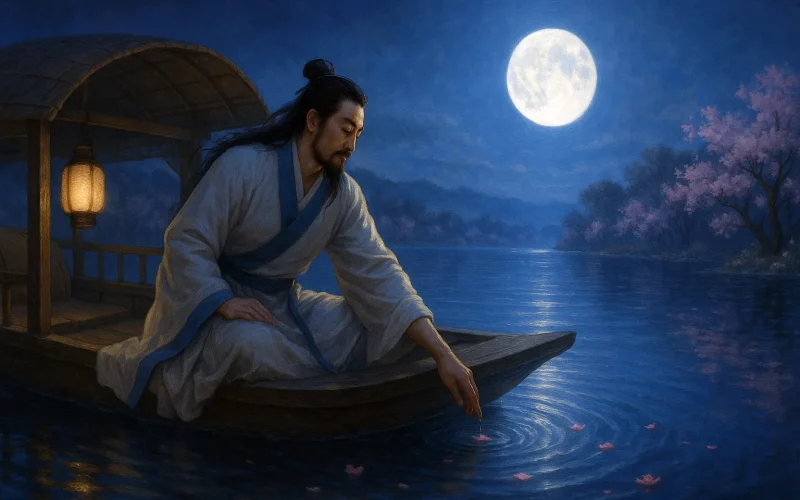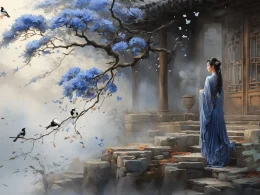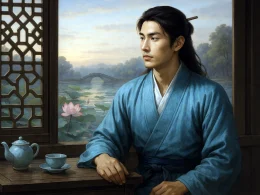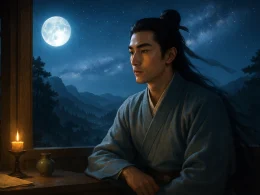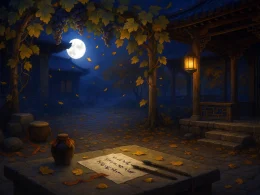The water clear cleans the moonlight bright;
The moon bright, white egrets fly.
My man’s coming with the maid so fair,
Singing on their way home ’neath the moon bright.
Original Poem
「秋浦歌 · 其十三」
李白
渌水净素月,月明白鹭飞。
郎听采菱女,一道夜歌归。
Interpretation
This poem is the thirteenth in Li Bai's "Songs of the Autumn River" series, composed during his later travels in the Qiupu region. Having experienced life's vicissitudes, the poet found spiritual solace in Qiupu's landscape and its people's simple ways. Like an elegant ink-wash painting, the poem blends natural beauty with folk life through understated realism, showcasing a rare serene beauty in Li Bai's oeuvre that reflects his yearning for pure humanity and reverence for natural life.
First Couplet: "渌水净素月,月明白鹭飞。"
Lù shuǐ jìng sù yuè, yuè míng bái lù fēi.
Clear water purifies the bright moon; In moonlight, white egrets fly.
This couplet constructs an ethereal visual realm. The enjambment creates rhythmic flow and overlapping imagery. "Purifies" is the poetic eye—it depicts water cleansing moonlight while hinting at the scene's purifying effect on the poet's soul. Moon and egrets, static and dynamic, one high above and one skimming water, weave a tranquil yet vibrant moonlit scroll.
Second Couplet: "郎听采菱女,一道夜歌归。"
Láng tīng cǎi líng nǚ, yīdào yè gē guī.
A youth listens to the lotus-gathering maid; Returning together, singing night songs.
The poet shifts focus from nature to human warmth. "Listens" captures the youth's captivated attention and emotional resonance. This transcends auditory pleasure to become heartfelt communication. "Together" and "returning" depict young men and women walking home harmoniously after labor. Their "night songs" echo through the darkness—joys of work, budding youth, and life's purest lyricism.
Holistic Appreciation
The poem's charm lies in its seamless harmony, achieving triple unity: internal nature harmony (water-moon fusion, egrets flying), human-nature harmony (people moving through the landscape, songs blending with night), and interpersonal harmony (youths returning together). Li Bai poeticizes labor and portrays love with pure subtlety. Devoid of worldly troubles or personal frustration, the poet immerses himself in this landscape and human connection, reaching self-forgetful unity. This is not just Qiupu's night scene but Li Bai's idealized paradise.
Artistic Merits
- Enjambment and Sonic-Pictorial Harmony: The first couplet uses enjambment ("moon" connection), the second links through "listens" and "songs," creating fluid rhythm like a night melody, achieving poetic-musical unity.
- Understated Realism with Rich Conception: Without ornamentation, allusion, or florid diction, plain narration crafts conception beyond words, reaching the artistic pinnacle of "true purity after lavishness falls away."
- Skillful Perspective Shifts: Viewpoint moves from overhead (water-moon) to eye-level/raised (egrets), focuses on shore/lake figures, then follows their "return," forming a complete, flowing aesthetic space.
- Passionate Emotion with Subtle Expression: Youthful affection and labor's joy are conveyed through subtle implication—"listens" and "returning together singing" hint at deeper feelings, leaving infinite imagination.
Insights
This poem offers precious insight for seeking inner peace in modern society. True tranquility and happiness often reside in intimate contact with nature and sincere engagement with simple living. Despite political frustration, Li Bai found spiritual refuge in Qiupu's moonlit nights, clear waters, and folk songs—demonstrating strong inner resilience. It reminds us that while pursuing grand goals, we shouldn't overlook small, tangible beauties around us: moonlight, songs, genuine human connection. These fundamental elements are the deepest forces that nourish our souls and resist life's nihilism.
About the poet

Li Bai (李白), 701 - 762 A.D., whose ancestral home was in Gansu, was preceded by Li Guang, a general of the Han Dynasty. Tang poetry is one of the brightest constellations in the history of Chinese literature, and one of the brightest stars is Li Bai.






